December 8, 2024, the Fushi Holdings · CUFE Business School Second Entrepreneur Forum and Chair Professor Appointment Ceremony was successfully held in Room 202 of the Academic Hall at Central University of Finance and Economics (CUFE). The event was hosted by CUFE Business School, co-organized by the CUFE Business School CEO Club, and strongly supported by Beijing Fushi Holdings Development Co., Ltd. CUFE Vice President Li Jianjun attended the forum and delivered a speech. The forum was also graced by the presence of Prof.Li Yuexin, Party Secretary of CUFE Business School; Lin Song, Dean of CUFE Business School and Director of the MBA Education Center; and Miao Runsheng, former General Manager of China Chengtong Group Finance Co., Ltd. Themed “Navigating the Digital and Intelligent Era: Embracing the Future,” the forum featured ten distinguished scholars and senior executives from leading enterprises as guest speakers. Over 200 business executives, alumni, faculty, and students participated in the event. The forum also marked the grand appointment ceremony of the inaugural cohort of Chair Professors for CUFE MBA. The event was hosted by Zhu Fei, Deputy Director of the MBA Education Center and Associate Dean of CUFE Business School, with the roundtable forum moderated by Prof.Liu Shubo, Head of the Department of Strategy at CUFE Business School. The forum was streamed live across multiple online platforms, attracting over 11,000 virtual participants. The on-site discussions and exchanges were dynamic, generating significant social engagement and positive feedback.
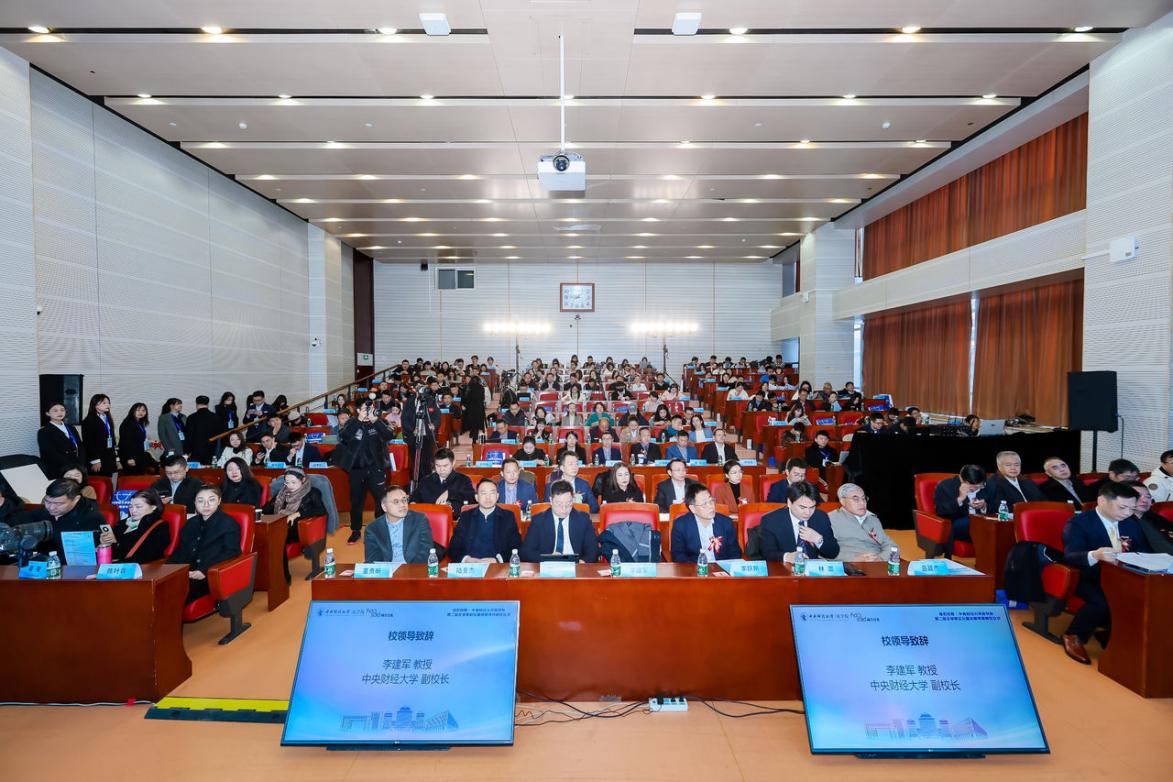
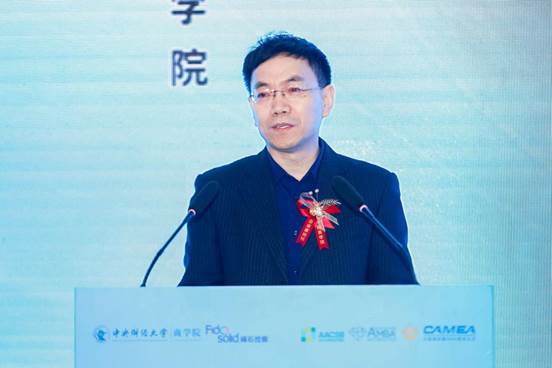
Li Jianjun, Vice President of CUFE, delivered the opening remarks, stating that digitalization and intelligence are undergoing profound integration and systemic innovation. The new wave of technological revolution, represented by big data, cloud computing, and artificial intelligence, has brought unprecedented opportunities for the high-quality development of education. He emphasized that CUFE is accelerating the integration of finance and economics talent cultivation with the demands of digital and intelligent enterprises, continuously advancing reforms in the higher education system for finance and economics professionals. Li highlighted that CUFE Business School, as a pioneer of reform and innovation at the university, has been actively exploring new models for cultivating interdisciplinary management talents. The school has introduced the innovative π-shaped Talent Development Framework, aiming to nurture high-level business management professionals who possess strengths in finance, financial management, and leadership, along with high-value creation capabilities and adaptability for future careers. He expressed his confidence that the widespread application of digital and intelligent technologies will drive the transformation and upgrading of traditional industries as well as the innovation and development of emerging sectors. Finally, Li expressed his hope that this forum would serve as a platform at the intersection of challenges and opportunities in the digital and intelligent era, bringing together collective wisdom to identify more proactive and sustainable strategies, sharing insights into the digital future, and fostering intellectual exchanges and collaborative success.
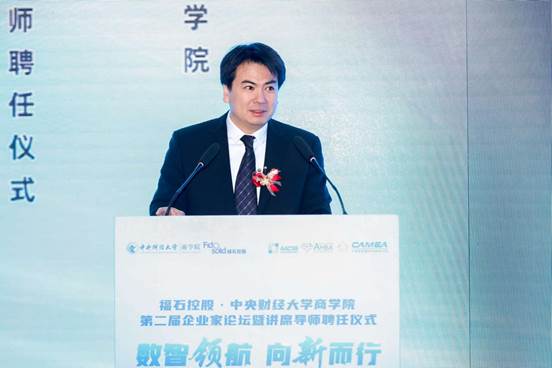
Professor Lin Song, Dean of CUFE Business School and Director of the MBA Education Center, delivered a speech discussing how business schools should cultivate entrepreneurs who can adapt to the demands of the times, given the continuous emergence of new industries, technologies, and models. Dean Lin specifically introduced the development and achievements of the CUFE MBA program. He pointed out that since its establishment in 2003, the program has been deeply rooted for 21 years and has remained committed to cultivating high-quality talent with international competitiveness. To keep pace with the changes of the times, CUFE MBA has newly launched three cutting-edge specializations: Dragon-Horse Financial Leadership, Technology Entrepreneurship and Investment, and Business Computing and Digital Management. Looking to the future, Dean Lin expressed his heartfelt hope that more entrepreneurs and alumni from the industry would actively participate in the talent cultivation process, contributing to the prosperity and development of the Business School. At the same time, he eagerly anticipated that the forum would provide an opportunity for guests to freely share their wisdom, promote academic exchange and cooperation, and jointly drive the robust development of talent cultivation.

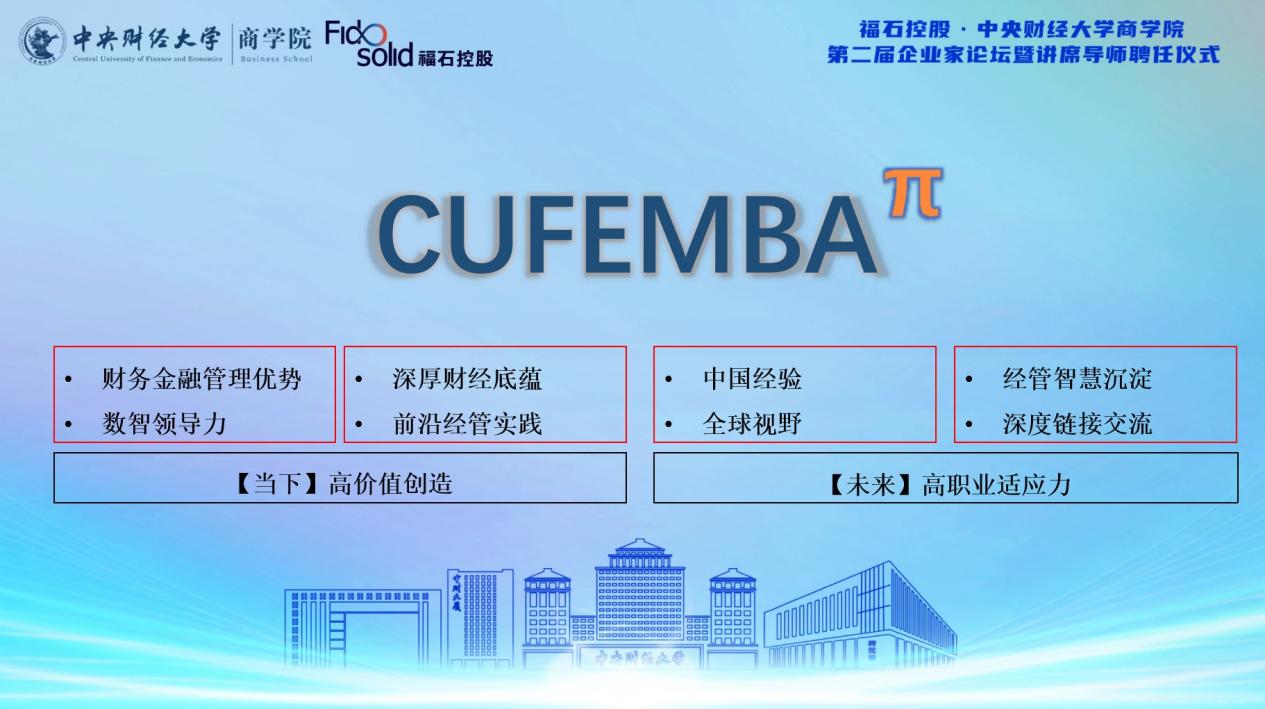
Zhu Fei, Deputy Director of the CUFE MBA Education Center and Associate Dean of CUFE Business School, introduced the CUFE MBA π-shaped Talent Model, an innovative initiative fully recognized by international accreditation experts and a key foundation for the launch of the Chair Professor system. He provided a detailed explanation of the process behind the development and the core concepts of the π-shaped Talent Model. Zhu pointed out that CUFE Business School officially introduced this innovative model and its training system in 2023. The model aims to address the demands of global economic development and the digital-intelligent transformation by cultivating talents equipped with both current high-value creation abilities and future adaptability to professional challenges. Zhu emphasized that the CUFE MBA π-shaped Talent Model leverages CUFE’s strong academic foundation and expertise. By integrating economics and management insights with deep collaborative engagement, the model develops high-level financial and economic management talents. These individuals possess strengths in finance, financial management, and digital-intelligent leadership, combined with a profound understanding of finance, cutting-edge practical experience in economics and management, and a dual perspective of Chinese insights and global outlook.
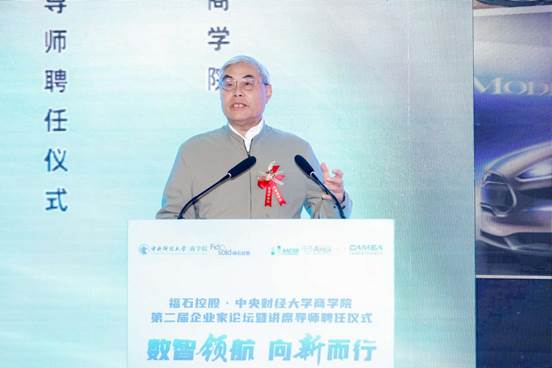
Professor Lv Tingjie, a professor at Beijing University of Posts and Telecommunications and Executive Vice Chairman of the China Information Economics Society, delivered a presentation titled "Empowering New-Quality Productivity with Digital and Intelligent Technology." He emphasized that the development of new-quality productivity is thriving along two key trajectories: energy and information. He pointed out that technology is not limited to digital information but also encompasses diverse fields such as energy and biotechnology. Reflecting on history, Professor Lü noted that energy technology has been the driving force behind industrial revolutions, while the information revolution has simultaneously flourished. He further explained that the ultimate frontier of artificial intelligence is computing power, and the ultimate frontier of computing power is new energy. Based on this perspective, he argued that the rapid development and advancement of artificial intelligence are inextricably linked to the continuous progress in energy technology. Through a series of compelling examples of vertical applications of artificial intelligence and supporting technologies, Professor Lü highlighted that China boasts an extensive vertical operational market and does not need to confine itself to competition in the field of general-purpose large models. He expressed his hope that China's digital technology industry will fully leverage its unique advantages, injecting robust momentum into economic transformation, upgrading, and recovery, ultimately contributing to the nation's economic growth and vitality.
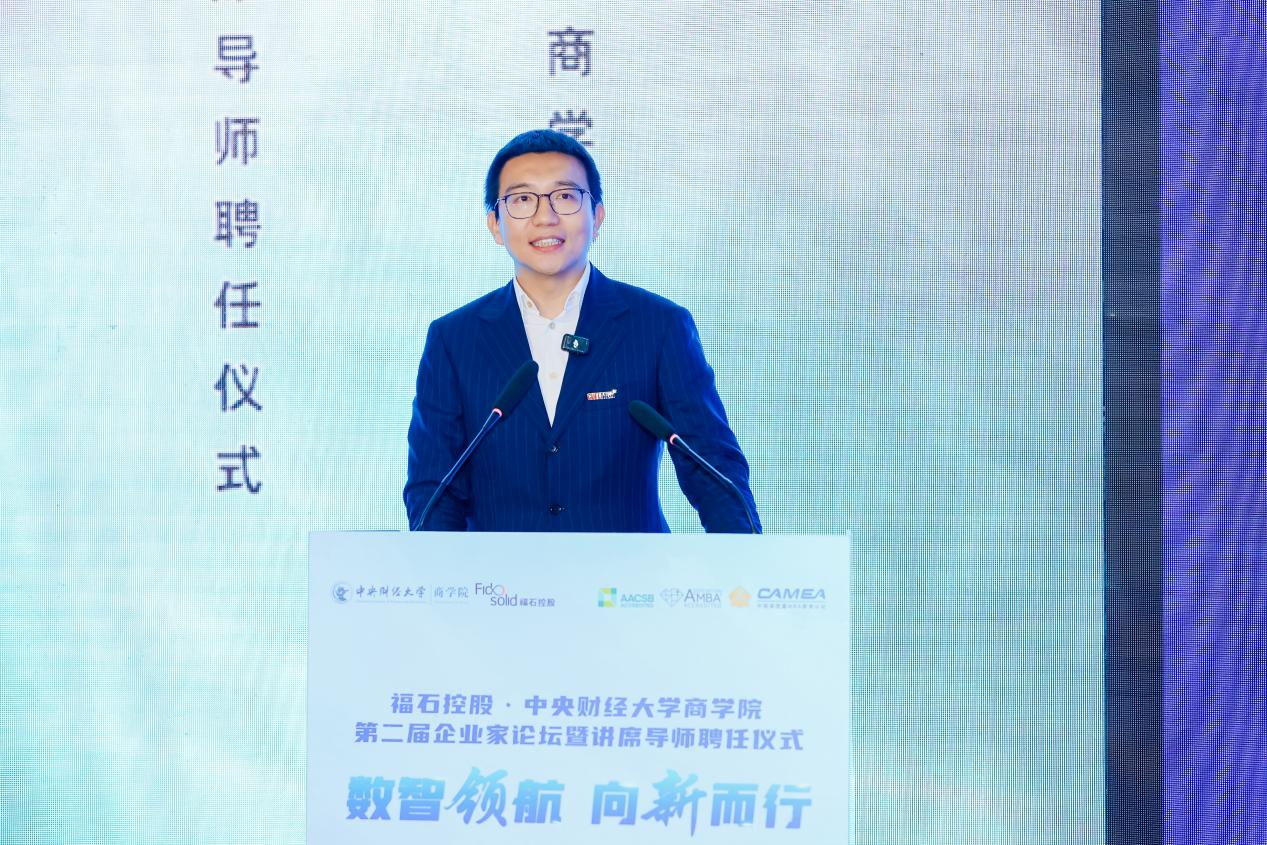
Huang Lei, former Vice President of Alibaba Group and Dean of Yicai Business School, delivered a presentation titled "Certainty and Instrumentality: AI Development in the Context of Chinese Business." Huang elaborated on the three key stages of technological development and emphasized that, from a macro perspective of the history of science and technology, we are currently in a major iteration cycle marked by the concentrated explosion of AI technologies. He highlighted that the future evolution of AI will focus on four critical areas: content generation, office collaboration, knowledge insight, and intelligent agents. Using vivid and detailed examples, Huang pointed out that the ultimate form of AI technology is not merely about replacing employees or roles, nor is it limited to the automation of production processes. Instead, AI will emerge as a transformative force that fundamentally redefines the output form of products from entire business organizations. When discussing organizational learning, Huang noted that it should be viewed as a collaborative learning process involving internal strategists, strategy implementers, directors, and frontline employees. In this process, each member can acquire knowledge and skills tailored to their role and needs. Over time, they collectively form a highly efficient "business machine" capable of adapting dynamically to commercial practices.
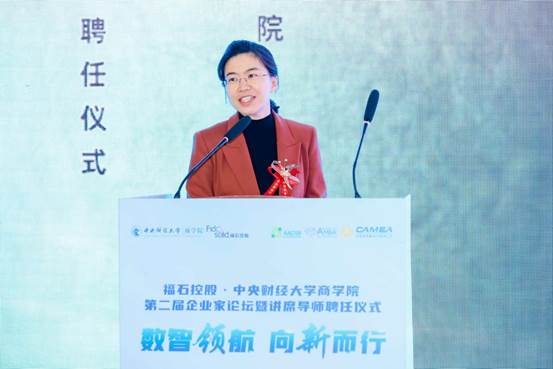
Zhang Fang, Deputy General Manager of the Data Management Department at the Postal Savings Bank of China, shared insights under the theme "AI Empowering the Quality Upgrade of Data Standards Management." She emphasized that the Postal Savings Bank of China is committed to driving the "acceleration" of digital finance by adhering to the principle of prioritizing standards. Data standardization serves as the starting point and cornerstone of data governance, laying the foundation for the consistent understanding, standardized usage, and efficient sharing of core data assets across the bank. Through relevant case studies, Zhang highlighted that in light of new trends in technological innovation, the banking sector must strengthen independent and controllable innovation. The digital transformation of traditional banks urgently requires the enhancement of new-quality productivity and the acceleration of the digitalization process. This transformation enables the provision of ubiquitous financial services to meet the needs of the digital economy and society, significantly enhancing the capacity to serve the real economy and improve the financial well-being of people's lives. She stressed that the emergence of new technologies has brought profound changes to the traditional financial industry, not only by significantly improving operational efficiency but also by reshaping the industry's structure. Moreover, these advancements have opened new dimensions for the financial sector, leading to the creation of numerous innovative financial products and service categories. Zhang expressed hope that, through continued efforts and growth, the bank could align technological capabilities with market demands, achieving resonance between technological strength and market dynamics while growing alongside its customers.
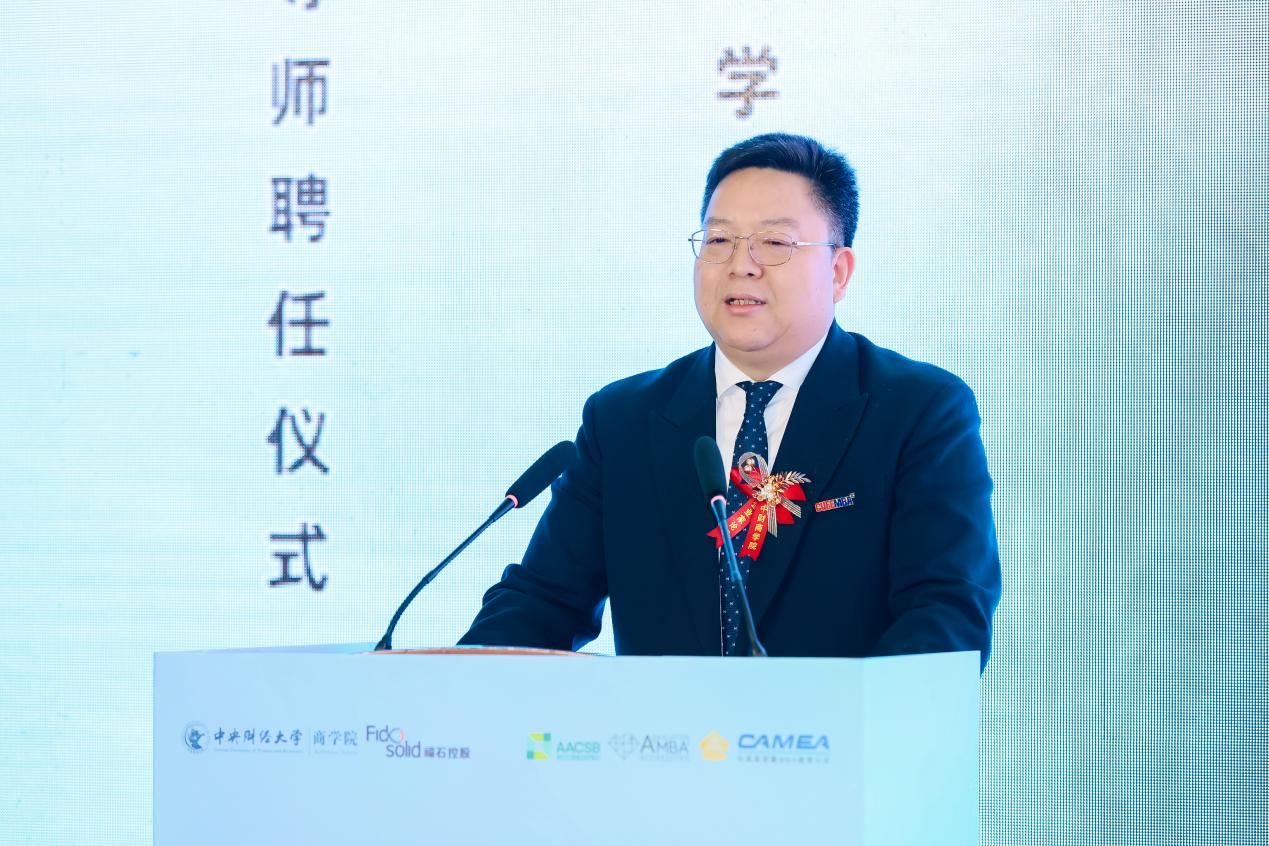
Chen Yongliang, Chairman of Beijing Fushi Holding Development Co., Ltd, shared his views on “The Application of AI in A-share Reorganization and Restructuring of Listed Companies--Taking Fushi Holding Doushen Education as an Example”. He firstly gave a brief introduction of Fushi Holding Co., Ltd. and elaborated on the company's important role and strategic positioning in the A-share market. He pointed out that in the A-share market, reorganization is an effective way to resolve the existential crisis of listed companies, while restructuring is a key initiative to promote the company's sustainable development and implement development issues. He further emphasized that the introduction of AI technology has given wings to the take-off of the A-share market. Taking FlinkAi platform and Doujin Education as examples, he detailed two successful practices that underwent restructuring and reorganization as well as AI empowerment. By virtue of its profound accumulation in the field of communication and the deep integration of cutting-edge AI technology, Fushi Holdings has successfully built a one-stop intelligent trading platform for brand communication and marketing management, FlinkAi, which is an innovative platform that connects individuals, small and medium-sized micro-enterprises with communication needs and fans with traffic, and has realized a pioneering transition from CtoC to AI. This innovative platform connects individuals with communication needs, small and medium-sized enterprises, and fan bodies with traffic, pioneering the direct communication mode from CtoC, forming a full-link intelligent marketing platform, and realizing the enhancement of commercial and social values through point-to-point accurate communication.
As a leading enterprise in language education in China, Doushen Education successfully completed its reorganization last year, realizing a magnificent turnaround of the enterprise. In this process, Dou Shen Education fully combined its deep advantages in the education industry with the innovative application of AI technology, and dedicated itself to solving students' essay writing problems, achieving remarkable results. He also shared the specific process of how Dou Shen Education utilized AI technology to promote reorganization and reorganization and increase market value. He said that through the precise analysis and personalized recommendation of AI technology, Doujin Education is able to provide students with more efficient and precise essay tutoring services, thus improving students' writing level and academic performance. This innovative application has not only won the recognition of the majority of students and parents, but also greatly enhanced the brand influence and market competitiveness of Dou Shen Education, and injected a strong impetus to the growth of the Company's market capitalization.
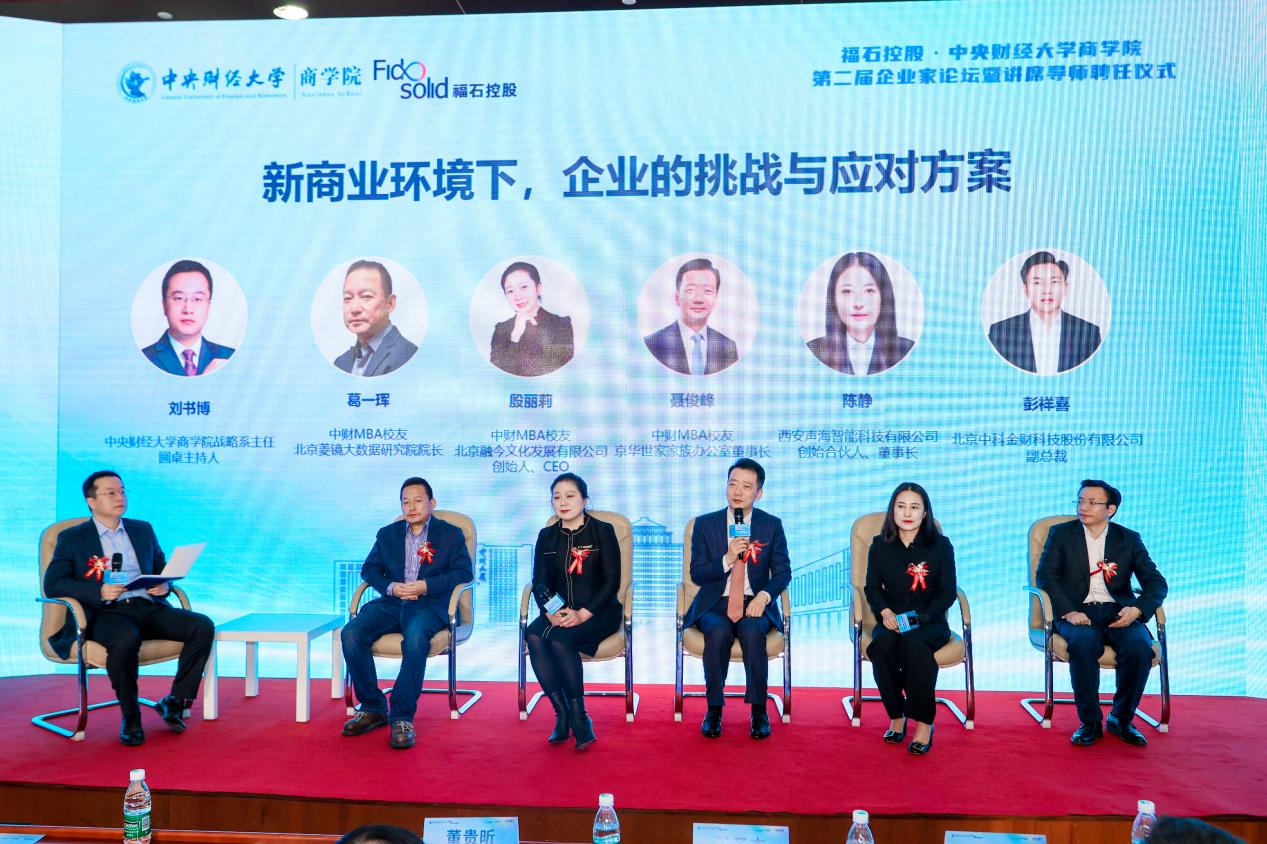
In the roundtable forum, Mr. Peng Xiangxi, Vice President of Beijing Zhongke Jincai Technology Co., Ltd, Mr. Chen Jing, Founding Partner and Chairman of Xi'an Soundsea Intelligent Technology Co. MBA alumnus Yin Lili, founder and CEO of Beijing Rongjin Culture Development Co., Ltd. focused on the theme of “Under the new business environment, enterprises need to accurately understand the evolution of the needs of target groups and flexibly adjust their strategies to cope with external market competition”, “How to determine the priority and entry point of technology application in the process of digital transformation to realize real digital value creation”, ‘How to build a perfect data governance system to ensure data security and compliance, and at the same time, fully explore the commercial potential of data assets to realize business growth’, ‘The challenges and solutions to address the challenges and solutions in the new business environment’. Business Growth”, ‘New Requirements of Enterprises for Talents in the New Era’, ‘How to Promote the Development of Industry-Education Integration in Business Schools’ and other related issues were exchanged and discussed in depth, and their insights were shared. The roundtable forum was moderated by Liu Shubo, Director of Strategy Department of CUFE Business School.
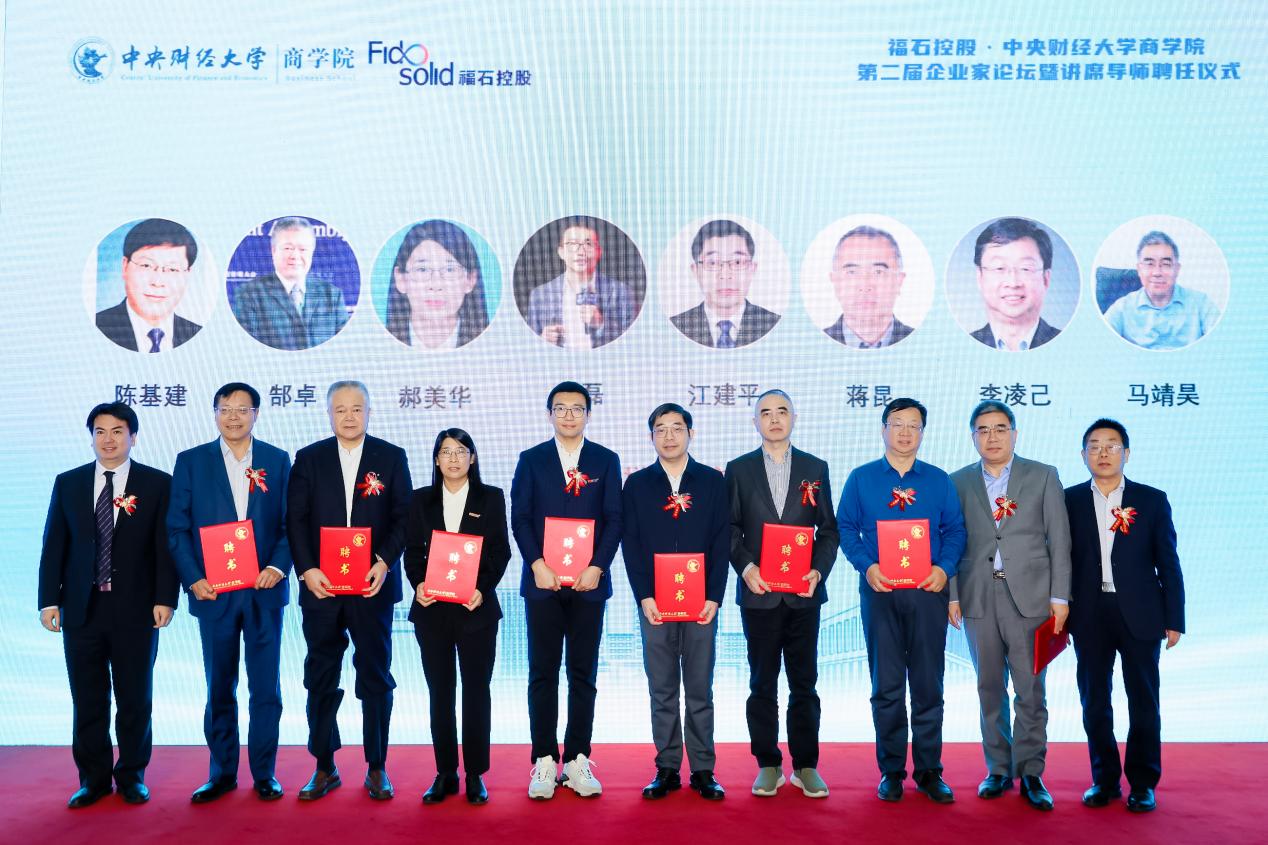
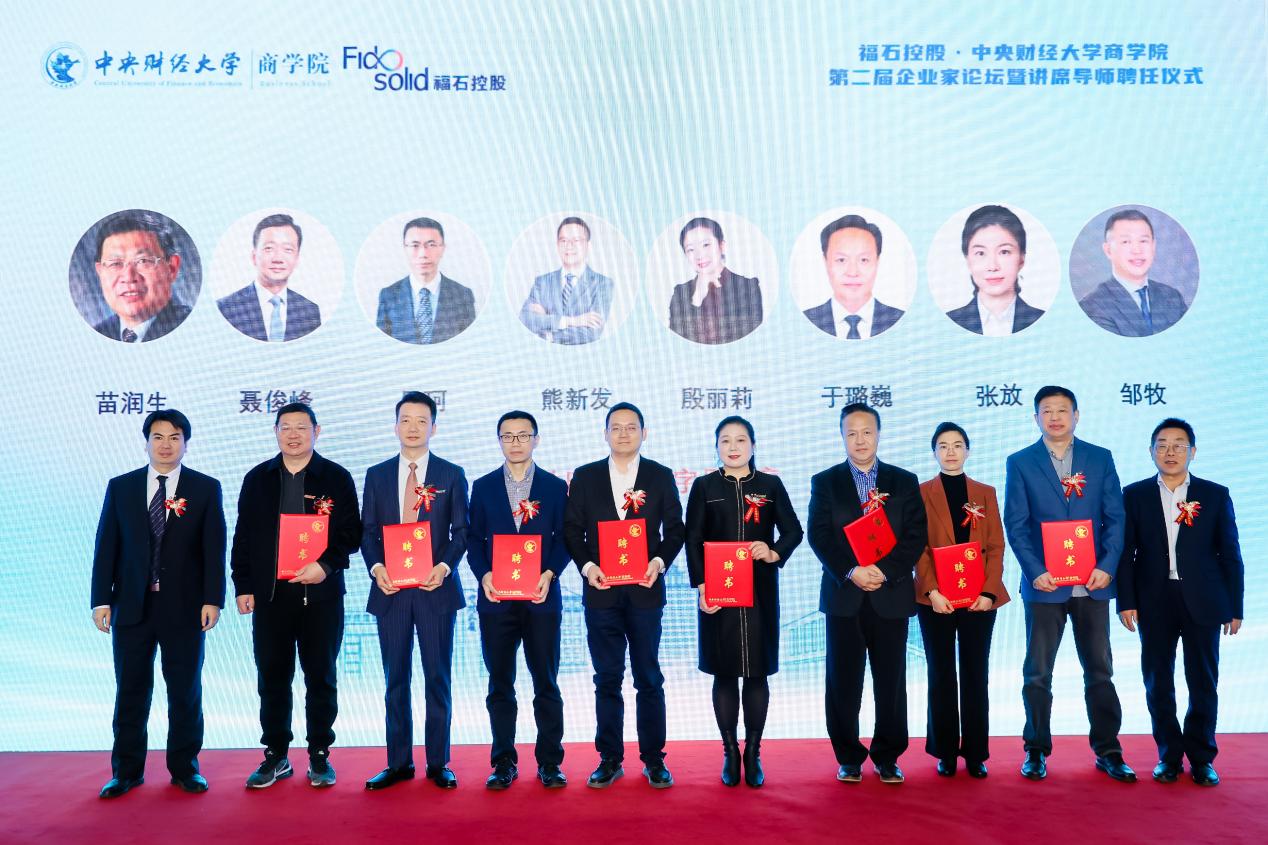
In order to actively respond to the new needs of the times and more effectively build a new talent cultivation model of π-type, aiming at cultivating management talents with both profound financial background and cutting-edge economic and management practice ability, the CUFE Business School officially appointed the first batch of 24 MBA chair tutors, and this forum held a grand appointment ceremony for the first batch of MBA chair tutors. Dr. Li Yuexin of the CUFE Business School and Lin Song, presented the appointment certificates to the tutors.
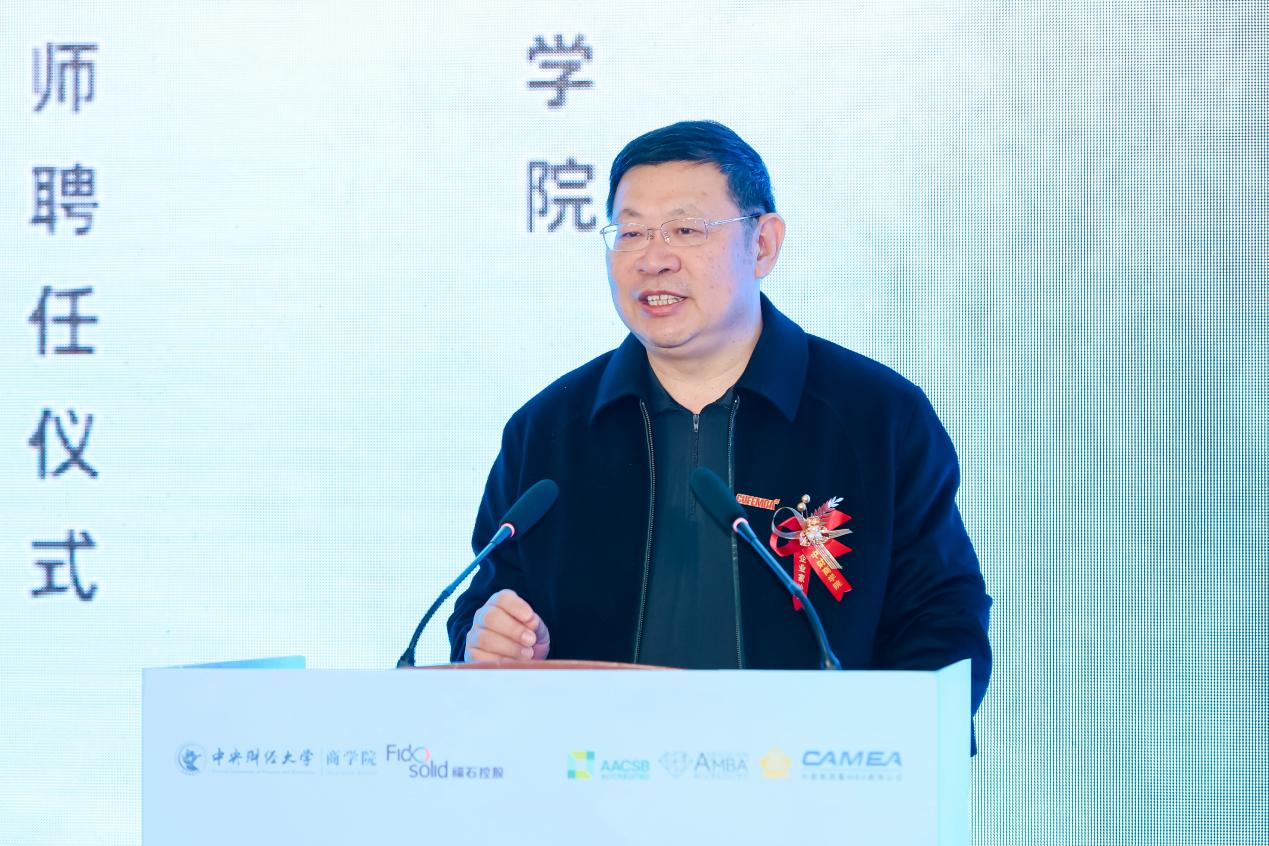
Mr. Miao Runsheng, former General Manager of China Chengtong Group Finance Co., Ltd. spoke on behalf of the tutors. He quoted the old saying “reading thousands of books and traveling thousands of miles”, emphasized the importance of combining learning and practice, and pointed out the positive role of finding a good master and a leader in improving one's cognitive level and broadening one's horizons. He spoke highly of the specialty setting and talent cultivation method of MBA education of CUFE, and said that on the basis of CUFE professors, MBA education of CUFE has introduced the off-campus mentor system, which provides students with richer and more diversified learning resources and growth platforms. This initiative not only allows students to have access to cutting-edge theoretical knowledge in the classroom, but also deepens their understanding of the business world through the sharing of practical experience by off-campus mentors. He suggested that students should pay more attention to the prerequisites when discussing cases and seek solutions to difficulties and dilemmas by combining the rich practical experience of external tutors. Finally, on behalf of the chair tutors, he expressed that he would strictly follow the school motto of “Loyalty, Unity, Pragmatism and Innovation” and actively contribute to the development of the school and the growth of students.
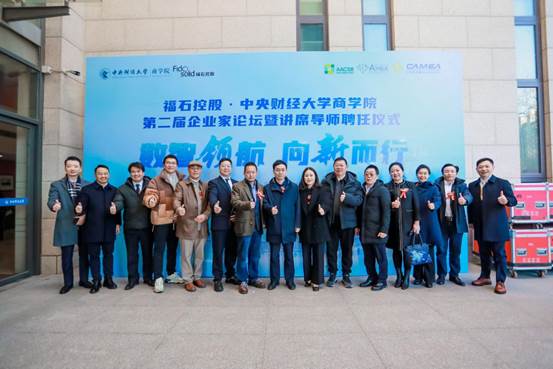
Entrepreneurs Forum is an important brand activity of CUFE Business School and MBA Education Center. The activity aims to gather a wider range of entrepreneurs and build a high-quality communication platform on cutting-edge topics for entrepreneurs, business executives, business schools and MBA alumni, which is an important initiative for the cultivation of π-type talents of MBA of CUFE, and also an important way for CUFE Business School to respond to the theme and mission of the times and to make the voice of CUFE heard. It is also an important way for CUFE Business School to respond to the theme and mission of the times and make the voice of CUFE heard.